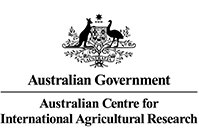
Pacific Pests, Pathogens & Weeds - Mini Fact Sheet Edition
Cabbage (mustard) aphid (332)

Summary
- Worldwide distribution. On plants in cabbage family and related weeds. An important pest.
- Infestations cause: i) curling, yellowing and stunting, expecially mustards; ii) honeydew that spoils quality; and iii) spread of virues.
- Adults 1.7 mm long. Wingless - greenish-yellow, covered in fine wax, with green bands along top of the body, and dark antenae. Winged - shiny black heads and prothorax (segment behind head), and green abdomen. In tropics, females give birth to living young without mating.
- Spread by winged forms in wind currents.
- Natural enemies: many predators and parasitoid wasps (e.g., Diaeretiella, Aphidius, Aphelinus).
- Cultural control: nursery hygiene: clean trays, pasteurise soil or use soilless mixes; avoid planting next to, or down-wind from infested crops; weed; remove infested leaves; destroy ant colonies with boiling water (or insecticides); collect and destroy debris after harvest.
- Chemical control: i) PDPs (derris, chilli, garlic, neem, pyrethrum); ii) soap solution, horticultural or white oils (see Fact Sheet no. 56). Avoid broad-spectrum products. Only use e.g., synthetic pyrethroids to kill ants.
Common Name
Cabbage aphid, mustard aphid, turnip aphid.
Scientific Name
Lipaphis erysimi, previously known as Lipaphis pseudobrassicae and Rhopalosiphum pseudobrassicae.
AUTHOR Grahame Jackson
Information from CABI (2017) Lipaphis eryimi (mustard aphid) Crop Protection Compendium. (www.cabi.org/cpc); and from Lipaphis eryimi (Kaltenbach) (2007) Crop Knowledge Master Department of Entomology, Honolulu, Hawaii. (http://www.extento.hawaii.edu/kbase/crop/type/lipaphis.htm). Photo 1-3 Alton N. Sparks, Jr., University of Georgia, Bugwood.org. Photo 4 Caroline Smith, University of Tasmania, Australia.
Produced with support from the Australian Centre for International Agricultural Research under project PC/2010/090: Strengthening integrated crop management research in the Pacific Islands in support of sustainable intensification of high-value crop production, implemented by the University of Queensland and the Secretariat of the Pacific Community.
This mini fact sheet is a part of the app Pacific Pests, Pathogens & Weeds
The mobile application is available from the Google Play Store and Apple iTunes.




Copyright © 2020. All rights reserved.
 Pacific Pests, Pathogens & Weeds - Mini Fact Sheet Edition
Pacific Pests, Pathogens & Weeds - Mini Fact Sheet Edition